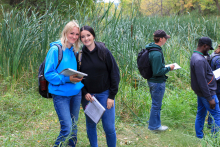Food security the focus of new program at ACC Adult Collegiate
August 11, 2015
Improving access to healthy food and good nutrition for all is at the core of a new Food Security certificate being offered this fall at Assiniboine Community College’s Adult Collegiate in downtown Brandon.
“This program meets a social need, a socio-economic need and a nutrition need — in downtown, and generally,” says Keith Williams, director of adult learning at the Adult Collegiate.
He says that the course will provide students with food-related life skills like gardening and household food budgeting, as well as skills for employment, like plant production.
The dual credit courses can also earn students advanced placement in the ACC Horticulture Production program, if they wish to continue their education.
The inaugural program starts Sept. 9 at the Adult Collegiate, and applications are being accepted now.
Courses run mostly in the afternoons, with some mornings. They include three compulsory horticulture classes and an elective. Students can opt to take courses full-time from September through January, or they can learn part-time over one to two years, or even longer.
Students can also pair their Food Security courses with high school-level courses to either upgrade their secondary school education or to earn a high school diploma for the first time.
“It’s designed to give students skills for today, and options for tomorrow,” Williams says. “These courses have immediate utility and are relevant to their lives.”
Students who earn the Food Security Certificate of Achievement can go on to further education, but will also be ready for basic entry-level horticultural work — a growing field that is expected to have hundreds of new openings within the next few years.
The Food Security program will also partner with community organizations to provide a hands-on learning experience.
“This is a program that’s suited to a wide range of students, even if they’ve been out of school for a while or struggled previously,” says Nancy Chiupka, an instructor in the program. “It’s short duration, hands-on, and is a great stepping stone to further education.”
To help ease barriers even further, the program is designed to be as affordable as possible. Fees to register and sign up are just over $100, with course fees only $30-40 per course. Textbooks are usually available to students on loan.
Williams says it’s affordable for students, and there is room to expand the program if there is future demand.
“There’s room for growth,” he says. “We are a community college and this meets the needs of the community.”
- Find out more: assiniboine.net/food-security



